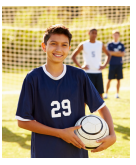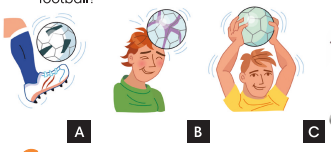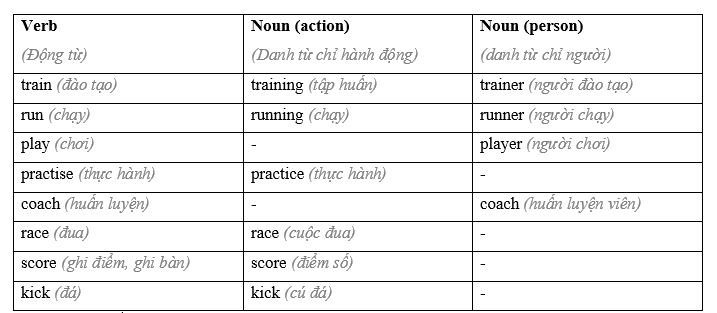Tiếng Anh 8 Unit 6 6.5 Listening and Vocabulary1. In pairs, answer the following questions: 2. Listen to the sports news about a young football player. Choose the correct answers. 3. Listen to a dialogue. Mark the sentences T (true) or F (false). Correct the false sentences. 4. Study the table. Decide if the word underlined is a verb, noun (action) or noun (person). 5. Work in pairs. Discuss if you would like to train for your favourite sport in a different country. Say why. Use the ideas below to help you. Quảng cáo
Lựa chọn câu để xem lời giải nhanh hơn
Bài 1 1. In pairs, answer the following questions: (Theo cặp, trả lời các câu hỏi sau:) 1. Who is your favourite football player? (Cầu thủ bóng đá yêu thích của bạn là ai?) 2. Who is the youngest football player you know? (Cầu thủ bóng đá trẻ nhất mà bạn biết là ai?) 3. What do you know about the football player in the picture? (Bạn biết gì về cầu thủ bóng đá trong bức tranh?)
Lời giải chi tiết: 1. My favourite football player is Cristiano Ronaldo. (Cầu thủ bóng đá yêu thích của tôi là Cristiano Ronaldo.) 2. The youngest football player I know is Gavi. (Cầu thủ bóng đá trẻ nhất mà tôi biết là Gavi.) 3. I don’t know the guy in the picture. (Tôi không biết anh chàng trong ảnh.) Bài 2 2. Listen to the sports news about a young football player. Choose the correct answers. (Nghe tin tức thể thao về một cầu thủ bóng đá trẻ. Chọn những đáp án đúng.) 1. What number football shirt did Martin Ødegaard first play football in? (Martin Ødegaard lần đầu tiên chơi bóng đá với số áo nào?)
2. What does Martin Ødegaard like to do in football? (Martin Ødegaard thích làm gì trong bóng đá?)
Phương pháp giải: Bài nghe: ...and the exciting news from the world of football today isthat Champions League winners Real Madrid have just signed up Martin Ødegaard from Norway. Ødegaard was born in 1998 and, at just sixteen years and thirty-six days, is the youngest in the team. It's less than a year since he first appeared in his number seventy-six shirt playing for Norway. In fact, Ødegaard only played in a few games for his mother country but he managed to score five times. What type of player is he? Does he like to run with the ball or head it? Ødegaard says he likes to have the ball and 'kick it'. What an exciting future he's going to have... Tạm dịch: ...và tin thú vị từ thế giới bóng đá hôm nay là nhà vô địch Champions League Real Madrid vừa ký hợp đồng với Martin Ødegaard từ Na Uy. Ødegaard sinh năm 1998, mới mười sáu tuổi ba mươi sáu ngày, là người trẻ nhất trong đội. Chưa đầy một năm kể từ lần đầu tiên anh xuất hiện trong chiếc áo số 76 khi chơi cho Na Uy. Trên thực tế, Ødegaard chỉ chơi một vài trận cho quê hương nhưng anh ấy đã ghi được 5 bàn thắng. Anh ấy là kiểu cầu thủ nào? Anh ấy thích chạy theo bóng hay đánh đầu? Ødegaard nói rằng anh ấy thích có bóng và 'đá nó'. Thật là một tương lai đầy trông đợi mà anh ấy sẽ có...
Lời giải chi tiết: 1. B. 2. A 1. B Thông tin: Ødegaard says he likes to have the ball and 'kick it'. (Ødegaard nói rằng anh ấy thích có bóng và 'đá nó'.) 2. A Thông tin: It's less than a year since he first appeared in his number seventy-six shirt playing for Norway. (Chưa đầy một năm kể từ lần đầu tiên anh xuất hiện trong chiếc áo số 76 khi chơi cho Na Uy.) Bài 3 3. Listen to a dialogue. Mark the sentences T (true) or F (false). Correct the false sentences. (Nghe một cuộc đối thoại. Đánh dấu câu T (đúng) hoặc F (sai). Sửa các câu sai.) 1. Ben would be afraid to live in a different country. (Ben sẽ sợ phải sống ở một đất nước khác.) 2. Arvil thinks Martin will learn Spanish quickly because he’ll do a language course. (Arvil nghĩ Martin sẽ học tiếng Tây Ban Nha nhanh chóng vì anh ấy sẽ tham gia một khóa học ngôn ngữ.) 3. Martin will have lots of free time when he finishes training. (Martin sẽ có nhiều thời gian rảnh khi anh ấy kết thúc khóa đào tạo.) 4. Ben thinks it will be difficult for Martin to be without his family. (Ben nghĩ rằng sẽ rất khó khăn cho Martin nếu không có gia đình bên cạnh.) 5. Martin’s uncle is going to be his coach. (Chú của Martin sẽ là huấn luyện viên của anh ấy.) Phương pháp giải: Bài nghe: B = Ben A = Avril B: Avril, did you hear about that footballer from Norway? A: Martin Ødegaard? Yes, he must be really excited. He's going to train with one of the best football teams in the world. B: He's only our age but he'll have to leave his country and live in Spain. I think that's a bit scary. A: But he's going to train with some great footballers. B: I know, but he'll have to learn another language. I don't think he speaks much Spanish. A: That'll be easy and he'll learn quickly because he'll be with Spanish people all day. B: That's true. What will he do in his free time? A: I don't think he'll have much free time because he'll be so busy. Footballers practise most days of the week. B: Yes, I suppose you're right. But ... he'll miss his family when he goes abroad. A: Ah, but he won't be without his family. His dad is a football coach and he'll coach Real Madrid now. He's coached his son since he was very small. B: That's cool! A: And don't forget the money he'll have when he's with Madrid. Footballers always get lots of money. B: If he scores lots of goals, he'll earn lots of money. A: Yeh, that's true. We'll have to wait and see. Tạm dịch: B: Avril, bạn có nghe nói về cầu thủ bóng đá đến từ Na Uy không? A: Martin Ødegaard? Có, anh ấy phải tuyệt thật đấy. Anh ấy sẽ tập luyện với một trong những đội bóng tốt nhất thế giới. B: Anh ấy cũng chỉ tầm tuổi chúng ta thôi mà sẽ phải rời khỏi đất nước của mình và sống ở Tây Ban Nha. Tôi nghĩ như vậy cũng hơi đáng sợ. A: Nhưng anh ấy sẽ được tập luyện với những cầu thủ xuất sắc. B: Tôi biết, nhưng anh ấy sẽ phải học một ngôn ngữ khác. Tôi không nghĩ anh ấy nói tiếng Tây Ban Nha nhiều lắm. A: Cái đó chắc cũng sẽ dề thôi và anh ấy sẽ học được nhanh chóng vì anh ấy sẽ ở với người Tây Ban Nha cả ngày mà. B: Đúng vậy. Anh ấy sẽ làm gì trong thời gian rảnh nhỉ? A: Tôi không nghĩ anh ấy sẽ có nhiều thời gian rảnh đâu vì anh ấy sẽ rất bận. Các cầu thủ tập luyện hầu hết các ngày trong tuần mà. B: Ừ, tôi nghĩ cậu nói đúng. Nhưng ... anh ấy sẽ nhớ gia đình khi ra nước ngoài. A: À, nhưng anh ấy sẽ không được như hiện tại nếu không có gia đình. Bố anh ấy là một huấn luyện viên bóng đá và bây giờ anh ấy sẽ huấn luyện Real Madrid. Ông đã huấn luyện con trai mình từ khi còn rất nhỏ. B: Tuyệt thật đấy! A: Và đừng quên số tiền anh ấy sẽ có khi đến Madrid. Các cầu thủ bóng đã luôn nhận được nhưng xkhoanr tiền kếch xù. B: Anh ấy càng ghi được nhiều bàn thắng, anh ấy sẽ càng kiếm được rất nhiều tiền. A: Đúng vậy. Cùng chờ xem. Lời giải chi tiết:
1. Ben would be afraid to live in a different country. (Ben sẽ sợ phải sống ở một đất nước khác.) => T Thông tin: He's only our age but he'll have to leave his country and live in Spain. (Anh ấy cũng mới chỉ tầm tuổi ta thôi mã đã phải rời khỏi đất nước của mình và sống ở Tây Ban Nha rồi.) 2. Arvil thinks Martin will learn Spanish quickly because he’ll do a language course. (Arvil nghĩ Martin sẽ học tiếng Tây Ban Nha nhanh chóng vì anh ấy sẽ tham gia một khóa học ngôn ngữ.) => F Thông tin: That'll be easy and he'll learn quickly because he'll be with Spanish people all day. (Cái đó thì cũng dễ thôi và anh ấy sẽ học được nhanh bởi vì anh ấy sẽ ở cùng người Tây Ban Nha cả ngày mà.) 3. Martin will have lots of free time when he finishes training. (Martin sẽ có nhiều thời gian rảnh khi anh ấy kết thúc việc đào tạo.) => F Thông tin: I don't think he'll have much free time because he'll be so busy. Footballers practise most days of the week. (Tôi không nghĩ anh ấy sẽ có nhiều thời gian rảnh đâu vì anh ấy sẽ rất bận. Các cầu thủ tập luyện hầu hết các ngày trong tuần mà.) 4. Ben thinks it will be difficult for Martin to be without his family. (Ben nghĩ rằng sẽ rất khó khăn cho Martin nếu không có gia đình bên cạnh.) => T Thông tin: Ah, but he won't be without his family. (À, nhưng anh ấy sẽ không được như hiện tại nếu không có gia đình.) 5. Martin’s uncle is going to be his coach. (Chú của Martin sẽ là huấn luyện viên của anh ấy.) => F Thông tin: His dad is a football coach and he'll coach Real Madrid now. He's coached his son since he was very small. (Bố anh ấy là một huấn luyện viên bóng đá và bây giờ anh ấy sẽ huấn luyện Real Madrid. Ông đã huấn luyện con trai mình từ khi còn rất nhỏ.) Bài 4 4. Study the table. Decide if the word underlined is a verb, noun (action) or noun (person). (Nghiên cứu bảng. Quyết định xem từ được gạch chân là động từ, danh từ (hành động) hay danh từ (người).) 1. Jack was too tired to finish the race. (Jack quá mệt để hoàn thành cuộc đua.) 2. Four nil! Do you know who scored the goals? (Bốn con số không! Bạn có biết ai đã ghi bàn không?) 3. There’s no football practice today. (Hôm nay không có buổi tập bóng đá nào.) 4. The team are training very hard. (Toàn đội đang tập luyện rất chăm chỉ.) 5. Their coach doesn’t look very happy. (Huấn luyện viên của họ trông không vui lắm.) 6. He’s useless! He can’t kick the ball at all. (Anh ta thật vô dụng! Anh ấy không thể đá bóng chút nào.)
Bài 5 5. Work in pairs. Discuss if you would like to train for your favourite sport in a different country. Say why. Use the ideas below to help you. (Làm việc theo cặp. Thảo luận nếu bạn muốn tập luyện cho môn thể thao yêu thích của mình ở một quốc gia khác. Hãy nói tại sao. Sử dụng những ý tưởng dưới đây để giúp bạn.) - family and friends (gia đình và bạn bè) - earn money (kiếm tiền) - the weather (thời tiết) - meet other teams / players (gặp gỡ các đội / người chơi khác) - learn another language (Học một ngôn ngữ khác) I wouldn’t want to … (Tôi không muốn…) It would be nice to … (Sẽ thật tuyệt …) Lời giải chi tiết: - I wouldn’t want to the weather to be too wet when playing this sport. (Tôi không muốn thời tiết quá ẩm ướt khi chơi môn thể thao này.) - It would be nice to meet other players. (Sẽ rất vui khi được gặp những người chơi khác.)
|
























Danh sách bình luận